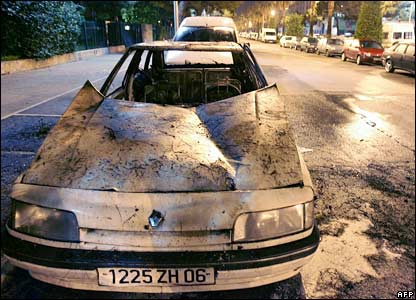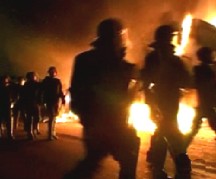“Ground for revolution is always fertile in the presence of absolute destitution.” – South African activist Steve Biko.
|
I always thought flames would engulf the City of Lights earlier than they did. It was not a wish by any means, more like a forecast based on personal experiences, the experiences of friends and acquaintances and my interpretation of the layman’s version of Newton’s third law: “Every action has an equal and opposite reaction.” I always knew that the lights of the Champs Elysées had long ago stopped shining on the paths of Black and Arab French citizens. I also knew that France''s motto of “Liberty, Equality, Fraternity” celebrated abroad was really the hammer that stifled the dreams and aspirations of some of its citizens at home. |
 |
As I watched the flames rise over the Citroën and Peugeot cars, I wondered if Toronto could suffer the same fate. “Not a chance!” I concluded after further analysis. I'll explain the reasons for that conclusion later.
The riots in France started after two young men, Zyed Benna and Bouna Traoré, died after climbing into an electrical power station in the Paris suburb of Clichy-sous-Bois while attempting to hide from Police. Two days earlier, Interior Minister Nicolas Sarkozy, after being pelted with stones while visiting one of the suburbs, called the inhabitants “gangrene” and “rabble.” What then followed was a series of explosions: cars were burnt, shops were destroyed, a few individuals were hurt, and many angry words were tossed about. These events first started in Paris and then spread across the country. In his first major address on the issue, French President Jacques Chirac, highlighting the problem, spoke of "a crisis of identity" in French society and condemned the poison of racism.
I got a first-hand taste of that poison on my very first day on French soil back in 1989.
I was en route to Montreal from my native Cameroon and had to stay overnight in Paris. I shared a hotel room with a friend near Orly airport. The evening we arrived, after checking in, we entered the elevator where two middle-aged blonde ladies were already standing. They looked us up and down, and then one of them said to the other, loudly and with a sly George W. smirk: “Ils ne peuvent pas rester chez eux ceux-là – These people can’t stay home!” and as they left the elevator the other lady murmured: “Sale nègres – Dirty n*ggers!” My friend and I looked at each other, angry and disgusted but also surprised at the sheer openness of this hatred. This, incidentally, was my very first experience with overt racism. Many years later, on subsequent visits, I was told by friends who lived in France that I had to carry my passport with me at all times as my skin colour made me a direct target of police officers eager to yell, “Papiers - Papers!”. The same friends also pointed out that they were routinely denied entry to stores and clubs and had a hard time finding apartments and jobs even though many of them were what is called “Bac+5” or “Bac+6” in France (High School diploma and a 5 or 6 year post-secondary degree).
Many other instances of this French racism have been documented.
|
Back in 2002, the BBC reported the case of Abdou Marega, who was flatly refused a waiter job at the famous Moulin Rouge in Paris with the comment: “We hire blacks for the kitchen, not for the front room.” Remember Oprah’s Crash Moment at Hermes, also in Paris? Even President Chirac, in his recent speech, was forced to ask: "How many CVs are thrown in the waste paper basket just because of the name or the address of the applicant?" And in terms of political representation (usually an indicator of openness in the corridors of power), with 15% of its citizens being visible minorities, France does not have a single non-white député (an MP) from the mainland in the National Assembly. |
 |
This is the context that created the recent riots, breathing life into South African activist Steve Biko’s words quoted above.
Disenfranchisement and racism also exist in Canada, as many of us can individually attest. But the context is significantly different, making explosions of the kind we saw recently near impossible here. For one thing, Canadian visible minorities are well represented at all government levels. Toronto has many non-white City Councillors, our Governor General is a black woman, and many of our Provincial and Federal Ministers (such as Mary Ann Chambers and Ujjal Dosanjh) are members of visible minority groups.
The ghettos of France that fostered much of the anger that spewed on the streets do not exist in Canada. We have many poor neighbourhoods, but nothing that so clearly isolates and alienates us as the enclaves of Clichy-sous-Bois. Also, the blatant discrimination that was at the root of the protests is not commonplace in many of Canada’s major cities. Our racism is subtle, usually accompanied by the fake politeness that is viewed overseas as a national hallmark. Our anti-discrimination laws, however, are also clear, and more importantly, their enforcement is, by comparison, much more fair-minded.
We are not living solitudes for many of our problems here in Toronto. Many of us work with, live with or interact on some personal level with people of other races and cultures. That is the genesis of the understanding of otherness that enlivens our humanity and helps foster a truly multicultural society.
Beyond the riots and their causes, what France and much of Western Europe are grappling with is a basic human emotion: fear; the fear of losing oneself, the fear of diluting what some in the extreme right-wing ranks view as “unsullied” Western culture and the fear of losing a standard of living in the face of ever-increasing minority populations. That fear also exists in Canada and in North America at large, although it is slightly tempered by the knowledge that, with the exception of our native populations, we are all immigrants.
In the end, we should all remember that population movements have and will always be part of the human experience. Along with them comes a re-definition of identities, fluctuating economic standards, and colourful faces on city streets. As Martinique-born French citizen Frantz Fanon wrote, “the consciousness of the self is not the closing of the door to communication.”
Eloi Minka is one of the founders of AfroToronto.com.




